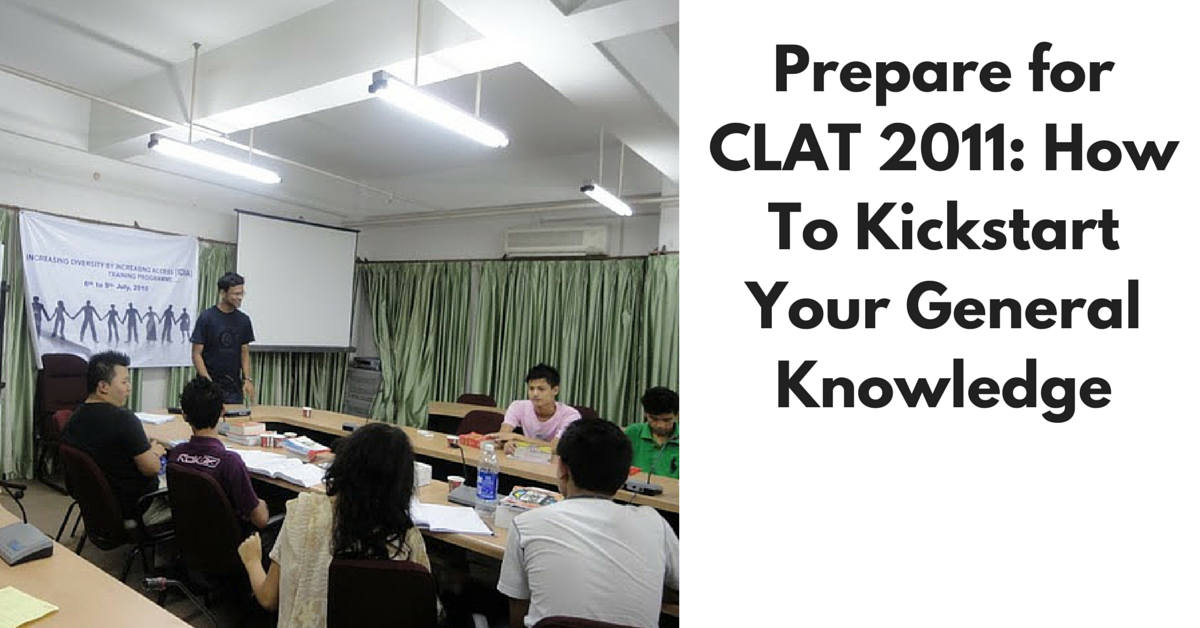This has been republished from A First Taste of Law archives.
A few days back, Aymen Mohammed, who is joining NALSAR this year, wrote to me saying that he would like to write something for A First Taste of Law. What I didn’t anticipate back then was that he would write something so useful, in a very precise and easy to follow manner, and time it so perfectly! This is the time when a lot of students are just starting to prepare for CLAT 2011, and wondering where to begin. Aymen gave a brilliant starting point for them. This would go a long way in solving the usual GK worries. The best thing is, this will help not only law aspirants, but anyone looking to build a good GK for any competitive exam!
G.K. – Nothing frightens NLS aspirants like these two letters put side by side. What scares a lot of us is the fact that the subject is very vast and needs constant study. While it mightn’t be the easiest subject on the CLAT paper, it remains very important. And people who are at least partially comfortable with the idea of General Knowledge will surely make it.
The General Knowledge section in recent times has seen a trend, with Static GK(History, Geography, Sciences) seeing a decline and Current Affairs rising. The CLAT 2009 and 2010 papers have also seen the anomalous replacement of Legal reasoning by Legal Knowledge.
This article is intended for people who still haven’t answered the important questions w.r.t GK: “Where should I start from?”, “What should I read?” and “How am I supposed to remember so much of info?!”
I. Where should I start from?
I am assuming that most of us have already been recommended a whole library of “helpful books” which are in fact colorless, thick sleep-inducing books. While it might’ve helped a certain person, it might not be of any help to you. Chuck them, asap.
Start with the basics, and scale up quick. Keep your GK prep simple.
Start by reading a good newspaper every day. I personally recommend The Hindu. Add it with the Times of India if you have the time – it has amazing Legal reports. A quarter of your GK prep is complete if you read the newspaper every day, without fail!
Read everything you come across in the paper, although it might be consuming, it is necessary that you read it.[I even checked the Government-issued Advertisements, that is how you’ll know about various government schemes in the country and the names of various self-obsessed Ministers and their portfolios.]
Make it a point to follow certain contributors/correspondents in the newspapers[especially their editorials]. Excellent examples being V. Venkatesan, N. Ram, Siddharth Vardarajan and Atul Aneja of The Hindu and Dhananjay Mahapatra of The Times of India. I recommend this because their articles are loaded with background information that’ll help you get a complete understanding of the issue besides the quality of the language will greatly help you with vocabulary and grammar.
A lot of Headlines and News reports will make no sense to you. Here is where Google and Wikipedia will come to your aid. Let’s take the example of Kyrgyzstan’s recent political crisis. The first thing that came to my mind was “Is that even a country?” it is. That is not where the questions should, that is where they must begin. Find out the name of the present Prime Minister, the name of the ousted prime minister, visit the BBC website and read out everything you can about the country’s recent history and reasons for the present crisis. In short explore, don’t stop. Keep asking: “Do I understand the issue completely?”
[Ramanuj: and, also, “is the story complete?”] If the answer is No, then continue Googling.Next, follow a Monthly Competitive Exam Magazine. Pratiyogita Darpan is perhaps the best one I know of. What happens is, when you read the magazine, you’ll come across a lot of reports(albeit concise) that you’ve already gone through. This will aid you in revision and will probably make a permanent impression in your mind. Use a Highlight marker or make notes of all the important reports. When the next issue is on stands, first go through your last month’s notes. By the time you write CLAT, you’ll have enough revision of the whole year, enough to last a lifetime!
MAKE NOTES:
Get yourself a big, clean notebook. Divide it into neat topics – allotting 10 pages to each. Whenever and wherever you get important information or relevant tidbits add it to the specific topic.[The topics I had were Personalities and Organizations, India: Static, India: centreCurrent, Books & Literature, Awards and Recipients, Business, Intl Affairs, Misc., etc]
II. What should I read?
- If you have joined a CLAT coaching center, I am sure they will have regular updates with “GK Supplements”. But as I’ve emphasized earlier, you need to explore. So here’s a small list of publications and websites that you can follow – doesn’t take much of your time. Alternate weekends should be good enough.
Penguin Yearbook(Don’t go for the Manorama Yearbook – terrible stuff with more advertisements than information). - GK Modules of your Coaching Centre(Something that I wish I had read them earlier and not procrastinated.
- Legal Websites like lawandotherthings.blogspot.com, Legally India, and Bar and Bench. Best thing – join their respective groups on Facebook [if they exist].
- Magazines like the Frontline, Outlook and the Economic and Political Weekly, EPW being an excellent source to enrich your knowledge and your language skills. PS – It has an FB group. Join it, it’ll keep you posted
- International Media – I recommend this for better understanding of international/western issues. Keep tabs on the BBC, NYT and The Guardian websites, they have excellent articles on nearly every issue. Almost comprehensive.[I remember being clueless about the Lisbon Treaty, this is how BBC came to my rescue – http://news.bbc.co.uk/2/hi/ europe/6901353.stm]The Ultimate Guide to L.L.B by Nisa Facial and M.A. Rashid – published by Lexis-Nexis.Take two pages at a time, answer them, and then correct them by referring the answers given at the end of each chapter. Nothing helps like a self-taken-test does.This list is neither comprehensive nor exhaustive. Neither should you let the list scare you into believing that it is “too much”.
III. How am I supposed to remember?
DISCUSS current issues with a group of friends. Every week, pick a topic that’s important(like the Bhopal Gas tragedy, the attack by Israel on the Freedom Flotilla, Naxalbari, Communalism, etc) and ask your friends to get good points on the history of the issue, the legal aspects of it and other related information.
WRITE notes on relevant information from time to time. Like I’ve mentioned, making regular notes helps you remember. For example, last year there was a coup d’etat [what does it mean, btw?] in Honduras[where is it?] so, I’d write, in the “Intl Affairs” section of my GK notes, this: Honduras’ present President – Manuel Zelaya. Months later, there was a regime change through elections, so right beside Zelaya’s name – I write: Porfrio Lobo(National party):succeeded Zelaya. So we have quiet a little information that we will remember.
QUIZ your friends and ask them to quiz you every week. Each friend could get 10-20 random questions, with options. Keep the options related and relevant. Once the quiz is over. Each person must explain the rest of the options as well. Here’s an example:
Q: Which armed resistance outfit did the late Vellupillai Prabhakaran lead?
- Hamas(Armed resistance group,also a political party, fighting against the Israeli siege on Gaza, and for the “complete liberation” of Palestine, and the elimination of Israel as a political entity, find out who it’s leader is)
Hezbollah(A Shiite Lebanese armed resistance group, also a political party, liberated Southern Lebanon from Israeli occupation, also fought Israel in the 2006 Israel-Lebanon war, find out its leader, and google more about the legal aspects of the 2006 war) - LTTE(Armed resistance group, was once the world’s largest, fought for a separate Tamil Eelam, was completely wiped out by the Sri Lankan Army)
- FARC(a Marxist-Leninist revolutionary guerrilla organization based in Colombia, which is involved in the ongoing Colombian armed conflict, headed by Alfonso Cano)
So each question will give you at least 3-5 extra doses of GK.
STAY AWARE: Issues have the tendency to affect our lives in weird ways. So always keep tabs on raging issues and don’t keep it stagnant. Take an INFORMED stand on all issues that matter. Naxalbari, Tribal rights, Human rights, communal-ism, minority politics, Politics, religion, everything. You’ll research more often, you’ll learn more often.
You’ll learn a lot of it by simply keeping your ears open. An example being me learning about Apartheid -Remember Eddy Grant perform on IPL’s closing night. The song he sang “Gimme Hope Joanna” was exactly about that[She got a system they call Apartheid, which keeps a brother in a subjection]. Who knows, you might learn something from a movie like Legally Blonde. 😛
FINALLY:
REVISE what you already have studied. Chances are, you’ll forget everything if you don’t go through all the stuff you’ve written – you’ll get confused. [Happened to me in NLU-D’s paper, THRICE. I didn’t revise, don’t make the same mistake] Reading up, Googling, and looking up topics is time consuming. But give it time, and enjoy it. Because unlike AR,
CR and Math – GK and Legal GK will/might help you immensely in Law School
FOLLOW UP on everything you read in the papers. For example, you read Varun Gandhi’s insipid hate speech during Elections ’09. You read up on the Model Code of Conduct, you read up on him being booked under the National Security Act, find out if the Act was misused or was applied appropriately, check the sections under NSA, read up everything. Including the place where he gave the speech(Pilibhit).
CHECK UP on the Past Years’ papers. While you’re going through them, solving them you’ll understand what’ll be important for you to read up from various magazines and publications, and what you can afford to leave out.
USE ANECDOTES to remember difficult names, records, etc. Usain Bolt’s record making run in Olympics was 9.69 seconds. The MTV Tickr had loads of jokes on his 9.69 record, a few months later he broke his own record, by slashing off .11 seconds from his old record making the new record to be 9.58.
That’s about it. Work sincerely and give it a little time. Take interest, take a stand on issues that matter, and enjoy the process – because if you don’t, you won’t learn anything, if you don’t learn – you will not retain.
Keep it simple and make it fun. Don’t slog, enjoy!
All the best for CLAT. Cheers!
 Serato DJ Crack 2025Serato DJ PRO Crack
Serato DJ Crack 2025Serato DJ PRO Crack










 Allow notifications
Allow notifications


